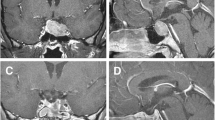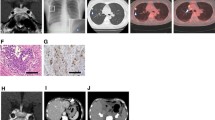Abstract
Ectopic ACTH-producing tumors preferentially secrete biologically inactive ACTH precursors and ACTH-related fragments. DMS-79 is known to secrete unprocessed high-molecular-weight (HMW) form ACTH. To determine whether prohormone convertase (PC) 1/3 is involved in the abnormal processing of proopiomelanocortin (POMC), we studied whether PC1/3 and 2 genes are expressed in DMS-79, and whether overexpression of PC1/3 gene affects POMC processing pattern. Steady-state mRNA levels of PC1/3 and 2 were determined by real-time RT-PCR. Molecular weights of ACTH-related peptides were determined by chromatographical analyses coupled with ACTH and β-endorphin (β-END) radioimmunoassays. PC1/3 gene was transfected into DMS-79 by retrovirus transduction using pMX-IP vector encoding PC1/3 cDNA. The steady-state mRNA levels of PC1/3 and 2 in DMS-79 were lower than those in ACTH-secreting and nonfunctioning pituitary tumors. DMS-79 predominantly secreted HMW form with both ACTH and β-END immunoreactivities by size-exclusion chromatography. After purification by immunoaffinity chromatography with anti-ACTH antibody, the apparent molecular weight of HMW form ACTH was estimated to be 16 kDa by sodium dodecyl sulfate-polyacrylamide gel electrophoresis with silver staining. After retroviral transfection of PC1/3 cDNA into DMS-79 and puromycin selection, PC1/3 stably-expressing cell line (DMS-79T) secreted two immunoreactive ACTH components, a major one coeluting with ACTH(1–39) and a minor one as a HMW form as well as two β-END immunoreactive components coeluting with β-lipotropic hormone and β-END, respectively. Thus, we have established PC1/3 stably-expressing cell line (DMS-79T) capable of proteolytically processing ACTH precursor molecule(s) into mature ACTH and β-END.
Similar content being viewed by others
References
Steiner DF. The proprotein convertases. Curr Opin Chem Biol 1998, 2: 31–9.
Seidah NG, Benjannet S, Hamelin J, et al. The subtilisin/kexin family of precursor convertases. Emphasis on PC1, PC2/7B2, POMC and the novel enzyme SKI-1. Ann N Y Acad Sci 1999, 885: 57–74.
Seidah NG, Gaspar L, Mion P, Marcinkiewicz M, Mbikay M, Chrétien M. cDNA sequence of two distinct pituitary proteins homologous to Kex2 and furin gene products: tissue-specific mRNAs encoding candidates for pro-hormone processing proteinases. DNA Cell Biol 1990, 9: 789.
Day R, Schafer MK, Watson SJ, Chrétien M, Seidah NG. Distribution and regulation of the prohormone convertases PC1 and PC2 in the rat pituitary. Mol Endocrinol 1992, 6: 485–97.
Benjannet S, Rondeau N, Day R, Chrétien M, Seidah NG. PC1 and PC2 are proprotein convertases capable of cleaving proopiomelanocortin at distinct pairs of basic residues. Proc Natl Acad Sci U S A 1991, 88: 3564–8.
Raffin-Sanson ML, de Keyzer Y, Bertagna X. Proopiomelanocortin, a polypeptide precursor with multiple functions: from physiology to pathological conditions. Eur J Endocrinol 2003, 149: 79–90.
Pritchard LE, White A: Neuropeptide processing and its impact on melanocortin pathways. Endocrinology 2007, 148: 4201–7.
Tateno T, Izumiyama H, Doi M, et al. Differential gene expression in ACTH -secreting and non-functioning pituitary tumors. Eur J Endocrinol 2007, 157: 717–24.
Tateno T, Izumiyama H, Doi M, Akashi T, Ohno K, Hirata Y. Defective expression of prohormone convertase 1/3 in silent corticotroph adenoma. Endocr J 2007, 54: 777–82.
Hirata Y, Yamamoto H, Matsukura S, Imura H. In vitro release and biosynthesis of tumor ACTH in ectopic ACTH producing tumors. J Clin Endocrinol Metab 1975, 41: 106–14.
Vieau D, Seidah NG, Mbikay M, Chretien M, Bertagna X. Expression of the prohormone convertase PC2 correlates with the presence of corticotropin-like intermediate lobe peptide in human adrenocorticotropin-secreting tumors. J Clin Endocrinol Metab 1994, 79: 1503–6.
Hale AC, Besser GM, Rees LH. Characterization of pro-opiomelanocortin-derived peptides in pituitary and ectopic adrenocorti-cotrophin-secreting tumours. J Endocrinol 1986, 108: 49–56.
Tsuchiya K, Minami I, Tateno T, et al. Malignant gastric carcinoid causing ectopic ACTH syndrome: discrepancy of plasma ACTH levels measured by different immunoradiometric assays. Endocr J 2005, 52: 743–50.
White A, Gibson S: ACTH precursors: biological significance and clinical relevance. Clin Endocrinol (Oxf) 1998, 48: 251–5.
Bertagna XY, Nicholson WE, Sorenson GD, Pettengill OS, Mount CD, Orth DN: Corticotropin, lipotropin, and beta-endorphin production by a human nonpituitary tumor in culture: evidence for a common precursor. Proc Natl Acad Sci U S A 1978, 75: 5160–4.
Shichiri M, Kato H, Doi M, Marumo F, Hirata Y. Induction of max by adrenomedullin and calcitonin gene-related peptide antagonizes endothelial apoptosis. Mol Endocrinol 1999, 13: 1353–63.
Tateno T, Nakamura N, Hirata Y, Hirose S. Role of C-terminus of Kir7.1 potassium channel in cell-surface expression. Cell Biol Int 2006, 30: 270–7.
Matsuno A, Okazaki R, Oki Y, Nagashima T. Secretion of high-molecular-weight adrenocorticotropic hormone from a pituitary adenoma in a patient without Cushing stigmata. Case report. J Neurosurg 2004, 101: 874–7.
Yamakita N, Murai T, Oki Y, et al. Adrenal insufficiency after incomplete resection of pituitary macrocorticotropinoma of Cushing’s disease: role of high molecular weight ACTH. Endocr J 2001, 48: 43–51.
Orth DN, Nicholson WE. High molecular weight forms of human ACTH are glycoproteins. J Clin Endocrinol Metab 1977, 44: 214–7.
Donald RA. ACTH and related peptides. Clin Endocrinol (Oxf) 1980, 12: 491–524.
Eipper BA, Mains RE. Peptide analysis of a glycoprotein form of adrenocorticotropic hormone. J Biol Chem 1977, 252: 8821–32.
Goodman LJ, Gorman CM. Autoproteolytic activation of the mouse prohormone convertase mPC1. Biochem Biophys Res Commun 1994, 201: 795–804.
Lindberg I, Ahn SC, Breslin MB. Cellular distributions of the prohormone processing enzymes PC1 and PC2. Mol Cell Neurosci 1994, 5: 614–22.
Milgram SL, Mains RE: Differential effects of temperature blockade on the proteolytic processing of three secretory granule-associated proteins. J Cell Sci 1994, 107: 737–45.
Sorenson GD, Pettengill OS, Brinck-Johnsen T, Cate CC, Maurer LH. Hormone production by cultures of small-cell carcinoma of the lung. Cancer 1981, 47: 1289–96.
Author information
Authors and Affiliations
Corresponding author
Rights and permissions
About this article
Cite this article
Tateno, T., Kato, M., Tani, Y. et al. Processing of high-molecular-weight form adrenocorticotropin in human adrenocorticotropin-secreting tumor cell line (DMS-79) after transfection of prohormone convertase 1/3 gene. J Endocrinol Invest 33, 113–117 (2010). https://doi.org/10.1007/BF03346564
Accepted:
Published:
Issue Date:
DOI: https://doi.org/10.1007/BF03346564




